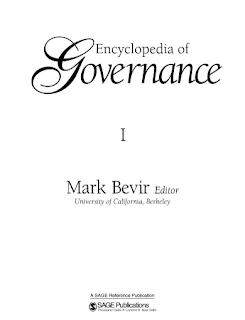 |
| Encyclopedia of Governance |
Governance and public policy
are two closely related concepts that play a fundamental role in the
functioning of societies and governments:
Governance:
Governance refers to the way a society or organization is managed, directed,
and controlled. It encompasses the structures, processes, and principles that
guide decision-making and the exercise of authority. Good governance typically
involves transparency, accountability, participation, and the rule of law.
Effective governance ensures that institutions function efficiently and fairly
to meet the needs and aspirations of the population.
Public Policy:
Public policy refers to the actions, plans, and decisions made by
governments and other public authorities to address specific issues and
challenges within a society. Public policy encompasses a wide range of areas,
including healthcare, education, environment, economy, and social welfare. It
is often formulated through a structured process of analysis, debate, and
decision-making to achieve specific objectives and outcomes.
Governance and public policy
are intertwined because governance structures determine how public policies are
formulated, implemented, and evaluated. Effective governance is essential for
the development and implementation of sound public policies that promote the
well-being of a society. Public policies, in turn, shape the rules and
regulations that govern various aspects of society, influencing everything from
the economy to social and environmental matters.
In summary, governance defines
the framework within which public policies are created and executed, while
public policies are the specific actions and strategies employed by governments
to address societal issues and achieve desired outcomes. Together, they form
the foundation for the functioning and development of modern societies.
